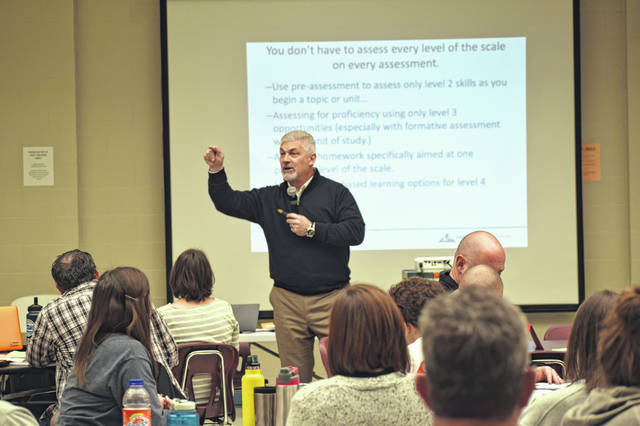

On Friday, teachers and staff gathered at Hayes High School for a day of professional development led by Dr. Phil Warrick, who focused his message on assessments and standard-based grading.
Hayes Assistant Principal Rex Reeder said the development day was aimed at improving the district for students and teachers by considering different types of grades and assessments.
“The number one thing is we are trying to find ways at Hayes to improve the educational experience for all students,” Reeder said. “We get a lot of awards and different things, but we aren’t scared to look at where we need to improve. We’re trying to improve the classroom for a different type of student in this time and age. We have to evolve. It’s not the 1950s anymore with the factory model.”
Reeder said the topic of the development was decided by teachers in the district, many of whom hope to see grading standards change and less focus being put on tests and tests only.
“Students have had a high stress level about grades and not so much about learning,” Reeder said. “We are trying to take a look at that. Why are kids failing? I don’t know if they know why they are failing. You’re already labelled a failure in the first two weeks of school if you fail your first test. It’s not the teacher’s fault, it’s the system’s fault.”
Reeder said a priority is bringing a set of consistent standards to every classroom so students can get feedback if they fail and take steps to improve.
“The sense is how do we make it very objective so kids know what to do,” Reeder said. “It shouldn’t depend on who the teacher is. We want to level the playing field for our students and staff. It’s been this way for a long time, and this has come from our staff. To be honest, (as a parent) I want to know what they can do to improve when they go to school. If they get a 78, I don’t know what that means. I want to know what they can do to improve.”
Reeder said he and other administrators are looking more at a system of standards and scales.
“A scale would tell you level by level what you need to do,” Reeder said. “I got an 83 on my English paper in 11th grade and I had no idea after why I got an 83. It was just the teacher’s opinion. I think it should be very objective. That builds confidence with parents and students. We are looking at a system to be able to get our staff on the same page to give our students a chance to succeed.”
Reeder said students are afraid of getting F’s on tests because one F can sink a student’s grade, even if they study, improve and end the course with an A.
“A lot of stress from students is the one-and-done test mentality,” Reeder said. “It scares kids to death. The ACT has it right in some ways — they take your best score. In this system, we’ll assess you, give you feedback, and then you come back to us and prove you can do this. We need to learn to fail a little bit, too. Students might get a low score because they are a beginner and that’s why they don’t take strong classes or try new classes. By the end of the course, they might be at an A, but because it’s an average score, that’s a C.”
Reeder said the school and district is still researching and looking into alternatives for the current system. He added that’s what Friday’s presentation from Warrick was all about.
“We have to do something to improve,” Reeder said. “We need to look at something different. This will never stop evolving. Change isn’t easy, but it’s needed. We have some work to do … to take it to another level and help all students. Being consistent and on the same page would be a nice thing. This is just the beginning.”
Hayes Principal Ric Stranges said the new system would be a lot of work, but it’s work the school is willing to do if the new system is demonstrably better.
“We’d like Hayes to be a lighthouse where people can see Hayes as the leader of innovation and instruction,” Stranges said. “If we are going to switch, it has to be based on good research.”
Reeder said the school will try some new ideas next school year as the start of a new five-year strategic plan, and the school will be consulting with staff, students, and parents along the way.
“Our job is to take care of our teachers and students. We can’t put our teachers out front with something new without them being fully versed and have every questioned answered before they get in there,” Reeder said. “They are in the trench with me.”



